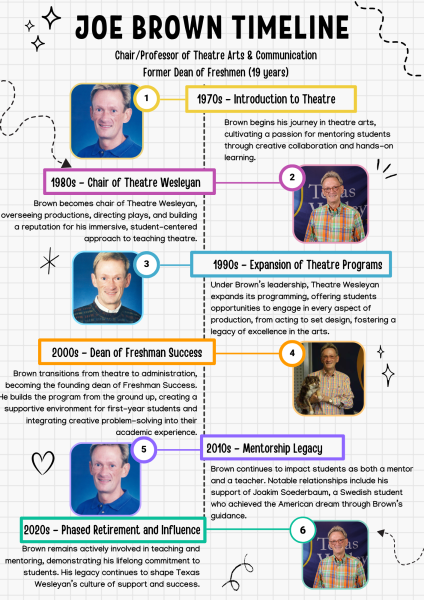At Texas Wesleyan University, Joe Brown’s name is synonymous with passion, mentorship and innovation. A theatre professor known for his hands-on approach to creative arts, Brown made a transition to the role of dean of freshman success in 2005. Brown’s career path illustrates the adaptability of skills gained in theatre, showing how they can contribute to broader educational success.
“When I made the transition, I saw it as a natural continuation of my work with students,” Brown said. “In theatre, you guide students through a journey — much like helping them navigate their first year of college. The principles are similar: problem-solving, confidence-building and learning through collaboration.”
Brown’s journey started in the theatre at TxWes in 2002, where he has spent 22 years mentoring students on and off the stage. As the chair of theatre arts and communication at TxWes, he took an active role in every aspect of the department, from directing plays to building sets. Brown’s commitment to supporting students extended beyond academics, shaping his approach as a mentor.
“I’ve always seen students’ journeys through college as similar to a theatre production,” Brown said. “Each of them has a role to play, and my job is to help them tell their stories in the best way possible.”
This approach to theatre — where collaboration and adaptability are key — laid the groundwork for his accomplishments as dean of freshman success.
“In theatre, you learn quickly that every production is a team effort, and things don’t always go as planned,” Brown said. “Those same skills — adapting, collaborating and thinking on your feet — have been invaluable in helping freshmen find their path in college.”
As dean of freshman success, Brown drew on his storytelling and problem-solving skills to help first-year students navigate the often-daunting transition to university life.
“Whether you’re putting on a play or guiding students through their first year of college, it’s the same. You have to be creative and resilient and work together to overcome challenges. That’s how you build success,“ Brown said.
For many students, Brown is more than just a professor or administrator. Dylan Evans, a freshman theatre major, recalls his first interaction with Brown during a high school performance of “Grease.”
“He came to one of my shows, and afterward, he pulled me aside and told me he enjoyed my performance,” Evans said. “He offered to help with scholarships and grants, but first, I had to audition for the theatre department.”
Evans described Brown’s patience and hands-on approach as invaluable throughout his freshman year.
“He’s always there, always smiling, always helping,” Evans said. “He treats us like people, not just students. It’s like he’s always looking out for us, whether we’re in the theatre or just dealing with life.”
Brown’s influence reaches beyond the classroom. Among students, he is affectionately known as ‘Papa Joe’ for his supportive and approachable nature.
“We started calling him that because he’s like a father figure to so many of us,” Evans said. “He’s always looking out for us and making sure we’re doing okay.”
Brown, who is also known as ‘Pro Joe,’ quickly became a go-to resource for students seeking guidance or a little extra motivation, offering a level of care that feels deeply personal. Dr. Alison Simons, associate professor of sociology, noted how Brown’s commitment shines through even in small acts.
“He’s known for knocking on dorm doors to make sure students are up for class,” Simons said. “He would literally go out of his way to ensure no one was left behind.”
Simons, now overseeing the Freshman Success program, credits Brown’s outgoing and approachable nature for his deep connections with students.
“If you need something, you go to Pro Joe. He’s always there,” she said.

Brown’s support for his students is evident across campus, with multiple students seeking his guidance. Evans recalled another time when Brown’s commitment to students shone through.
“There’s this kid in my class who doesn’t have the best home life. Brown found out about it and asked if the kid lived on campus,” Evans said. “When I told him no, he immediately tried to figure out a grant to help him stay on campus. He looks out for everyone.”
These connections to his students are what set Brown apart. It’s not just about academic success; it’s about ensuring every student feels supported both inside and outside the classroom.
“It’s about making sure students know they have someone in their corner, both in the classroom and in life,“ Brown said.
An example of Brown’s commitment to his students is his relationship with a former freshman from Sweden, Joakim Soederbaum. He initially came to Texas Wesleyan to play soccer and over time, he developed a close bond with Brown and his partner, considering them like family.
“He started as an athletic training major and then changed over to exercise science and a double major in English. He graduated first in his class at Wesleyan and went to Wesleyan Law School,” Brown said. “Then A&M bought the school, and he has an A&M law degree.”
When he was a TxWes student, Brown and his partner decided to offer Soederbaum both financial and emotional support during his college years.
“He came to me for advice and help with his writing during his first semester,” Brown said. “I discovered he didn’t have a father in his life, and his mother raised three boys on her own. My partner and I, who also grew up without fathers, decided to support him in ways we had never been supported ourselves.”
During his time at Texas Wesleyan, Soederbaum thrived, working for The Rambler and serving as a head resident in housing. Today, he is a top litigation lawyer in Dallas, married to a doctor, and a father of four sons, whom Brown affectionately considers his “grandsons.”
“I once asked him what would have happened if he hadn’t been in my ASE class, and he said he didn’t want to think about it,” Brown said. “Joakim’s journey is a perfect example of coming to the U.S. with very little but achieving the American dream through hard work.”
This relationship exemplifies Brown’s dedication to his students. He and his partner essentially “adopted” Soederbaum, helping cover his college expenses, car insurance and other essentials. Brown’s support left a lasting impact on Soederbaum’s life, underscoring the influence he has had on his students.
“We stayed connected even after he graduated,” Brown said. “He became such an important part of our lives that we shared many milestones together.”
Brown didn’t just inherit the title of dean of freshman success — he built the program from the ground up.
“He saw a need and created the Freshman Success program,” Simons said. “He’s not just a figurehead; he’s deeply involved in every aspect.”
Brown’s commitment to student success is reflected in his hands-on approach to mentorship, from creating personalized support programs to checking in regularly with students. For Evans, Brown is more than just a teacher.
“He’s like a friend who genuinely cares about your success,” he said. “[Brown] is old, weird, and cool — all at once.”
Despite announcing his phased retirement, Brown has found it challenging to step away entirely. Simons recalled a moment when he couldn’t resist signing up to teach an ACE class.
“He called me one day, advising theatre students, and said, ‘I’m going to be teaching section 21. I just can’t walk away,'” Simons said.
For Brown, teaching is more than a job — it’s a calling.
“Teaching has never been just a job for me,” Brown said. “It’s about connecting with students, understanding their individual stories, and helping them grow both in and out of the classroom. That’s what keeps me going every day.”
As he gradually transitions, Brown’s legacy at Texas Wesleyan remains deeply rooted in his commitment to students and his vision for their future.
“I’ve always believed that if you invest in students, you’re investing in the future of the university,” Brown said. “My hope is that the support I’ve given will continue to impact students long after I’m gone.”
Simons believes his dedication will keep him connected to campus life for years to come.
“He’ll never retire,” she said. “He loves interacting with students too much. Even in phased retirement, he couldn’t stay away.”
Brown’s transition from theatre to freshman success demonstrates how skills learned in the arts, such as adaptability, communication and empathy, can support students in various areas of life.
“Theatre teaches you so much about life — how to adapt, communicate, and connect with people,” Brown said. “I’ve always believed that those skills can help students in any area they pursue.”









![Pippin, played by Hunter Heart, leads a musical number in the second act of the musical. [Photo courtesy Kris Ikejiri]](https://therambler.org/wp-content/uploads/2025/04/Pippin-Review-1200x800.jpg)
![Harriet and Warren, played by Trinity Chenault and Trent Cole, embrace in a hug [Photo courtesy Lauren Hunt]](https://therambler.org/wp-content/uploads/2025/02/lettersfromthelibrary_01-1200x800.jpg)
![Samantha Barragan celebrates following victory in a bout. [Photo courtesy Tu Pha]](https://therambler.org/wp-content/uploads/2025/05/20250504_164435000_iOS-834x1200.jpg)





![Hunter Heart (center), the play's lead, rehearses a scene alongside other student actors. [Photo courtesy Jacob Sanchez]](https://therambler.org/wp-content/uploads/2025/04/thumbnail_IMG_8412-1200x816.jpg)
![Student actors rehearse for Pippin, Theatre Wesleyan's upcoming musical. [Photo courtesy Jacob Rivera-Sanchez]](https://therambler.org/wp-content/uploads/2025/04/Pippin-Preview-1200x739.jpg)
![[Photo courtesy Brooklyn Rowe]](https://therambler.org/wp-content/uploads/2025/05/CMYK_Shaiza_4227-1080x1200.jpg)

![Lady Rams softball wraps up weekend against Nelson Lions with a victory [6 – 1]](https://therambler.org/wp-content/uploads/2025/04/Screenshot-2025-04-04-100924-1200x647.png)
















